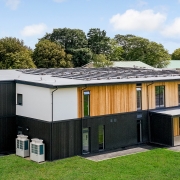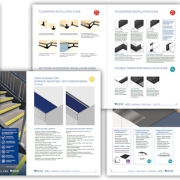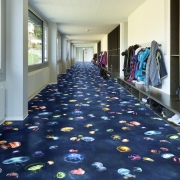Zentia, the UK’s market leader in complete ceiling solutions, is proud to announce the launch of Gridline, the redesigned and streamlined suspended ceiling grid system, replacing Prelude 24 XL2 and TLS along with Prelude 15 XL2 and TLS. This exciting development reflects Zentia’s commitment to innovation, aesthetics, and enhanced functionality in the realm of ceiling solutions.
Gridline, Innovation that clicks.
Consisting of main runners and cross tees a with newly designed clip, the Gridline ceiling system offers a perfect fusion of form and function, designed with a keen focus on ease of installation, versatility, and aesthetic appeal.
Gridline offers a comprehensive range of features and benefits, including:
- One clip, two systems – The system has been engineered so that only one clip is required for two systems, meaning less inventory for teams on site
- Stainless steel clips – offering enhanced corrosion resistance and longevity
- Audible click – The new clip system requires less force to assemble and a click on assembly leading to an easier installation process and improved ergonomics for installers
- A wide double stitch pattern – providing improved torsional strength, minimising the risk of damage and maximising the possibility for reuse
- Rectangular rout hole – Supplying a secure connection and resulting in less movement of the grid system once installed
- Quick release tab – The new tab has been designed to offer fast and easy disassembling, giving easy access to services when required and reducing damage for effective reuse
- UK Manufactured – The Gridline system is manufactured at Zentia’s own facilities in Gateshead, shortening the supply chain and investing in the UK market
Roy Gleiwitz, Regional Sales Manager for the UK, ROI and Baltic States at Zentia commented on the launch: “Gridline embodies Zentia’s unwavering dedication to innovation, serving as a testament to our commitment to push boundaries in ceiling design. With Gridline, we prioritise not just progress, but meaningful advancement, ensuring our products evolve alongside the needs of the construction industry. In other words, it’s all about innovation that clicks.”
Zentia is committed to the continual pursuit of innovation, which is why it forms one of its four brand pillars. The new development of products such as Gridline results from a dedication to create solutions that help the construction industry streamline and simplify operations. The launch of Gridline is also an exemplar of another Zentia brand pillar, UK Focus, with the new product manufactured at Zentia’s factory in Gateshead. As we continue to uphold our brand pillars of Innovation and UK Focus, we remain steadfast in delivering excellence at every turn.
About Gridline
Engineered with a fusion of form and function, Gridline is a suspended ceiling frame system, offering enhanced benefits including one-clip versatility, stainless steel durability, and an audible click assembly for effortless installation.
About Zentia
Zentia is the UK’s market leading manufacturer of complete ceiling solutions. They make a wide range of mineral ceiling tiles, suspension grids, and floating ceiling systems at their two factories in Gateshead, Tyne and Wear.
Evolved from Armstrong Ceiling Solutions and with over 100 years of knowledge and experience, Zentia is the UK’s only major ceiling manufacturer, offering a shorter supply chain to the construction industry in the UK and Ireland, and providing specifiers and ceiling contractors with reliable products they can trust.











